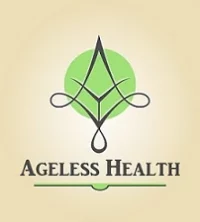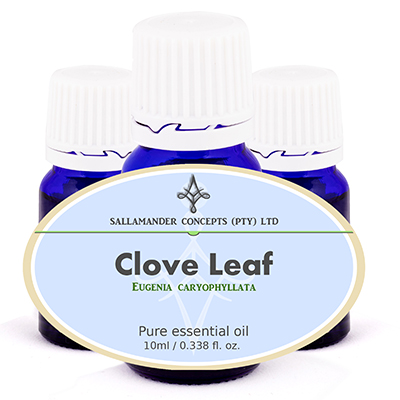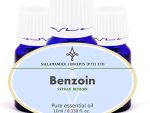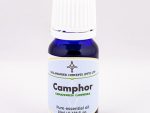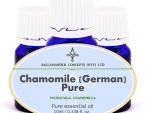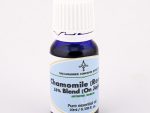Clove leaf essential oil
Clove leaf essential oil (Syzygium aromaticum, formerly Eugenia caryophyllus) can be used for acne, bruises, burns and cuts, keeping infection at bay and as a pain reliever. It helps with toothache, mouth sores, rheumatism and arthritis. It is beneficial to the digestive system, effective against vomiting, diarrhea, flatulence, spasms and parasites, as well as bad breath. Clove oil is valuable for relieving respiratory problems, like bronchitis, asthma and tuberculosis. The disinfecting property is useful in cases of infectious diseases. Placing a few drops of clove oil on a cotton ball and then placing the cotton ball in a linen cupboard will not only fragrance the cupboard, but will help to keep fish moths at bay.
Our Thieves blend, discovered to have been in use since the 1600’s (the blend was originally a blend of the herbs that was macerated into vinegar – known anecdotally to have been used by 4 thieves to prevent them from getting sick) contains clove as one of the essential ingredient as Clove essential oil is known for its antibacterial properties. Thieves blend is an anti-microbial blend of essential oils thought to help protect against influenza and other viral infections.
Oil Properties
Clove Leaf Essential Oil has a warm, strong, spicy smell and the oil is colorless to pale yellow with a medium to watery viscosity.
Origin
A native of Indonesia and the Malacca Islands. Clove (Syzygium aromaticum, formerly Eugenia caryophyllus) is an evergreen tree that grows to about 10 meters (30 feet) tall and has bright green leaves and nail-shaped rose-peach flower buds which turn, upon drying, a deep red brown. These are beaten from the tree and dried. The Latin word ‘Clavus’ means nail shaped, referring to the bud. It was often used by the Greeks, Roman and the Chinese, to ease toothache and as a breath sweetener, especially when talking to the Emperor. It has antiseptic properties and was used in the prevention of contagious diseases, such as the Plaque. It was an important commodity in the spice trade and is still used in perfumes, mulled wines and liqueurs, love potions, dental products, stuck in an orange as pomade and an insect repellent.
Extraction
Clove Essential Oil can be extracted from the leaves, stem and buds. We sell clove leaf oil, which is extracted by water distillation, containing the desired lower percentage of eugenol.
Chemical composition
The main chemical components of clove oil are eugenol, β-caryophyllene, α-caryophyllene eugenol acetate and iso-eugenol.
Precautions
Clove Leaf Essential Oil is a moderately potent essential oil and should be used with care. If it is used in an excipient (fatty oil, lotion or cream) and applied to the skin, the concentration should be relatively low. It may cause irritation to the skin and mucous membranes of some individuals (Clove oil is commonly used to treat toothache, so caution is advised in this regard).
Notes are found that if the oil is ingested, it can negatively influence blood clotting, the effect of anti-depressants and pain medication – this leads us to suggest caution when using Clove Leaf essential oil on the skin and to avoid broken or sensitive skin when using this oil.
Avoid use of this oil in people with any form of bleeding problem (hemophiliacs, people taking anti-coagulant medication).
Avoid using on the skin of infants, babies and toddlers (1 to 3 years of age).
Please read our page with heading: Safety with Essential Oils before using this oil.
We recommend the following book as an excellent resource regarding safety:
Essential Oil Safety: A Guide for Health Care Professionals by Robert Tisserand & Rodney Young (#ad)
Therapeutic properties
The therapeutic properties of clove leaf essential oil are analgesic, antiseptic, antispasmodic, anti-neuralgic, carminative, anti-infectious, disinfectant, insecticide, stimulant, stomachic, uterine and tonic.
Uses
Clove leaf essential oil can be used to keep infection at bay and as a pain reliever. It helps with toothache, mouth sores, rheumatism and arthritis. It is beneficial to the digestive system, effective against vomiting, diarrhea, flatulence, spasms and parasites, as well as bad breath. Clove oil is valuable for relieving respiratory problems, like bronchitis, asthma and tuberculosis. The disinfecting property is useful in cases of infectious diseases. Placing a few drops of clove oil on a cotton ball and then placing the cotton ball in a linen cupboard – this will not only fragrance the cupboard, but will help to keep fish moths at bay.
Burners and vaporizers
In vapor therapy, clove oil can be useful for bronchitis and dizziness and to help lift depression, while strengthening memory and fighting weakness and lethargy.
Blended Massage Oil
Clove leaf essential oil can be used in a blended massage oil to assist with diarrhea, bronchitis, chills, colds, muscular numbness, spasms, rheumatism and arthritis. For toothache, the outer jaw can be massaged with this oil after it has been suitably blended.
Blended in a Cream
See ‘Blended Massage oil’ above.
Mouthwash
Clove Leaf Essential Oil can be included at an extremely low rate in pharmaceutical preparations. Biting down on a whole clove is thought to be effective – rather don’t use the essential oil.
Suggested Dilution Rates
On the skin
Adult:
Face: Maximum of 0.6%
Body: Maximum of 0.6%
Bath: Maximum of 0.6%
3 to 24 months:
Face: Avoid
Body: Avoid
Bath: Avoid
4 to 6 years:
Face: Maximum of 0.5%
Body: Maximum of 0.5%
Bath: Maximum of 0.5%
6 to 15 years
Face: Maximum of 0.5%
Body: Maximum of 0.5%
Bath: Maximum of 0.5%
Pregnancy
Face: Maximum of 0.5%
Body: Maximum of 0.5%
Bath: Maximum of 0.5%
- When in doubt consult your doctor / medical professional before use.
- Most professionals and/or Aromatherapists will always err on the side of safety when giving advice regarding the use of essential oils and oleo resins during pregnancy.
- Quite a number of Aromatherapists advise that you should avoid essential oils completely while pregnant, specifically during the first trimester. This is a very safe approach but may not be necessary at all.
Diffusers and Vaporisers
4 to 8 drops
General:
- When using for the first time – Always use the lowest dilution rate and build up slowly to the maximum. Stop using all essential oils on the skin if irritation or allergy occurs.
- Any advice or instruction received from a medical professional ALWAYS supersedes recommendations or advice found on this website. When in doubt consult your doctor / medical professional.
Summary
Clove Leaf Essential Oil is useful for its disinfecting properties, pain relief (especially toothache) arthritis and rheumatism. It is effective when used for complaints of the digestion system. It is used as an insect repellent. It should be used with caution and at a very low dilution rate. Clove leave essential oil should not be used on the skin of children under the age of 3 years.
Blends
It blends well with Basil, Benzoin, Cinnamon, Lavender, Ginger, Sandalwood (Mysore)and Clary Sage.
